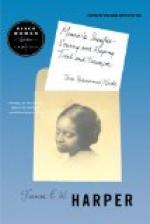Chapter VII
Ten years have elapsed since Minnie came to brighten the home of Thomas Carpenter, and although within the heart of Anna there is a spot forever green and sacred to the memory of her only child, yet Minnie holds an undivided place in their affections.
There is only one subject which is to them a source of concern. It is the connection of Minnie with the colored race. Not that they love her less on account of the blood that is in her veins, but they dread the effect its discovery would have upon the pleasant social circle with which she is surrounded, and also the fear that the revelation would be painful to her.
They know that she is Anti-Slavery in her principles. They have been careful to instil into her young mind a reverence for humanity, and to recognize beneath all externals, whether of condition or color, the human soul all written over with the handmarks of divinity and the common claims of humanity.
She has known for years that their home has been one of the stations of the underground railroad. And the Anti-Slavery lecturer, whether white or colored, has always been among the welcomed guests of her home. Still they shrink from the effect the knowledge would have on her mind. They know she is willing to work for the colored race; but they could not divine what it cost her to work with them.
“It seems to me, Anna, that we ought to reveal to Minnie the fact of her connection with the colored race. I am afraid that she will learn in some way that will rudely shock her; whereas we might break it to her in the tenderest manner. Every time a fugitive comes I dread that our darling will be recognized.”
“Nay, Thomas; thy fears have made thee over sensitive. Who would imagine he saw in this bright and radiant girl of fifteen the little five-year-old child we took to our hearts and home? I never feel any difference between her and the whitest child in the village as far as prejudice is concerned. And if every body in the village knew her origin I would love her just as much as I ever did, for she is a dear good child.”
“Well, dear, if you think it is best to keep it a secret, I will not interfere. But we must not forget that Minnie will soon be a young lady; that she is very beautiful, and even now she begins to attract admiration. I do not think it would be right for us to let her marry a white man without letting her know the prejudices of society, and giving her a chance to explain to him the conditions of things.”
“Yes,” said Anna, “that is true; I have heard that traces of that blood will sometimes reappear even in grandchildren, when it has not been detected in the first. And to guard against difficulty which might arise from such a course, I think it is better to apprise her of the facts in the case.”
“It is time enough for that. I want her to finish her education before she thinks of marrying, and I am getting her ready to go to Philadelphia, where she will find an excellent school as I have heard it very highly spoken of. She is young and happy, trouble will come time enough, let me not hasten its advent.”




